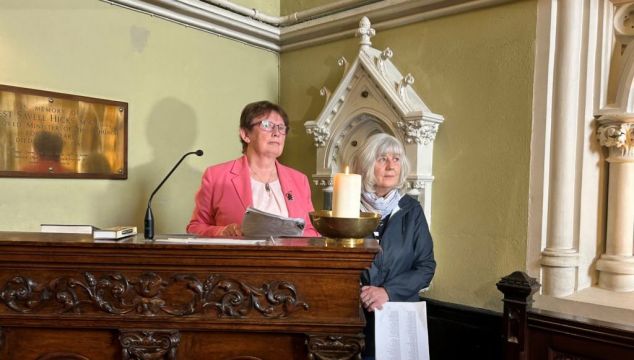The names of the nearly 3,600 people who died as a result of conflict in Northern Ireland between 1966 and 2019 were read out loud as part of a ceremony in Dublin.
The event was held at the Dublin Unitarian Church on St Stephen’s Green.
Speaking before the ceremony, the church’s Minister Rev Bridget Spain said the reading of the names is worthwhile to remember those who died.
“It was such a waste of life, we don’t want to go back there,” she said.
“It gives those dead people a voice, just for the second it takes to read their name,” she added.
Several volunteers took turns reading the alphabetical list throughout the three-hour ceremony.
Ms Spain said members of the congregation and the wider public come and go, and nobody is expected to stay for the entire ceremony.
“25 years on (from the Good Friday Agreement), we seem to think that everything is OK.
“If our publicity here makes somebody think back to what it was like then and say: ‘We’re not going there, can we work towards something better?’
“It’s worth it.”
She said it can be very emotional reading the list of names.
The church said the commemoration is the only religious service of its kind in Ireland.
It said the shooting in February of PSNI Detective Chief Inspector John Caldwell is “a grim warning that the killings may not be over.
“These readings illustrate powerfully the terrible, random nature of death in war and civil conflict.
“All human life and death is in these mournful lists: British soldiers, IRA volunteers, loyalist paramilitaries, Ulster policemen and women, part-time UDR men, prison officers, gardai, civil rights marchers, judges, businessmen, farmers, taxi drivers, social workers, housewives, children of all ages.
“People killed walking home from the pub, while watching football on the television, while attending church; people killed on buses and trains; and walking and shopping and visiting in London and Birmingham, Dublin and Monaghan, Belfast and Derry and Banbridge and Omagh and a score of other Northern Irish towns and villages.”
Difference is the essence of humanity
Referencing the recent raised terrorism threat level in Northern Ireland, Ms Spain wanted to spread a message of optimism on the occasion.
“I’m trying to say to people to think back to that time when everybody was so optimistic.
“Let’s think back to those good days and try and get back there and work on what was built 25 years ago.”
Opening the ceremony, Ms Spain quoted John Hume: “Difference is the essence of humanity.
“Difference is an accident of birth and therefore should never be your source of hatred.
“The answer to difference is to respect it.
“Therein lies the most fundamental principle of peace: Respect for diversity.”
Abbey Theatre artistic Director Caitriona McLaughlin was the first volunteer to read names.
Referencing the ending of The Crucible, she said: “The people on this list had no choice what truth or untruth they would sign their name to.
“The names we read today are associated forever with the trauma we call the Troubles but by reading these names they will not be defined by it.”







